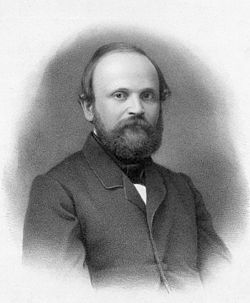Robert Remak Quote
The extracellular genesis of cells in animals seemed to me, ever since the publication of the cell theory [of Schwann], just as unlikely as the spontaneous generation of organisms. These doubts produced my observations on the multiplication of blood cells by division in bird and mammalian embryos and on the division of muscle bundles in frog larvae. Since then I have continued these observations in frog larvae, where it is possible to follow the history of tissues back to segmentation.
Robert Remak
The extracellular genesis of cells in animals seemed to me, ever since the publication of the cell theory [of Schwann], just as unlikely as the spontaneous generation of organisms. These doubts produced my observations on the multiplication of blood cells by division in bird and mammalian embryos and on the division of muscle bundles in frog larvae. Since then I have continued these observations in frog larvae, where it is possible to follow the history of tissues back to segmentation.
Tags:
biology, cell theory, cells, embryology, genesis, history, observation, schwann, science, theodor schwann
Related Quotes
Perhaps if zoologists would contemplate the wide variations presented by many plants of indubitably one and the same species, and the still wider diversities of long cultivated races from an original...
Asa Gray
Tags:
animals, biology, domestication, homo sapiens, man, plants, races, science, species, variation
To establish evolutionary interrelatedness invariably requires exhibiting similarities between organisms. Within Darwinism, there's only one way to connect such similarities, and that's through descen...
William A. Dembski
Tags:
biology, conclusions, darwinism, evidence, evolution, homology, id, ignorance, intelligent design, interpretation
About Robert Remak
Robert Remak (26 July 1815 – 29 August 1865) was an embryologist, physiologist and neurologist, born in Posen, Prussia, who discovered that the origin of cells was by the division of pre-existing cells. as well as several other key discoveries.
According to historian Paul Weindling, Rudolf Virchow, one of the founders of modern cell theory, plagiarized Remak's notion that all cells come from pre-existing cells. Remak had concluded this after observing red blood cells from chicken embryos in various stages of division. He then confirmed that the phenomenon existed in the cell of every frog's egg immediately after fertilization, proving that this was a universal phenomenon and finally explaining the reason for the results of tests by Louis Pasteur which had previously proved that there exists no spontaneous generation of life.
Remak obtained his medical degree from Friedrich Wilhelm University in Berlin (now Humboldt University of Berlin) in 1838 specializing in neurology. He is best known for reducing Karl Ernst von Baer's four germ layers to three: the ectoderm, mesoderm, and endoderm. He also discovered unmyelinating Schwann cells that surround peripheral nerve fibres, now named Remak cells, and the nerve cells in the heart sometimes called Remak's ganglia. He studied under Johannes Müller at the University of Berlin.
Despite his accomplishments, because he was a Jew, he was repeatedly denied full professor status, and finally late in life was appointed assistant professor, being the first Jew to teach in that institute. Even then he was never fully recognized for his discoveries.
His son Ernst Julius Remak was also a neurologist and his grandson was the mathematician Robert Remak who died in Auschwitz in 1942.
According to historian Paul Weindling, Rudolf Virchow, one of the founders of modern cell theory, plagiarized Remak's notion that all cells come from pre-existing cells. Remak had concluded this after observing red blood cells from chicken embryos in various stages of division. He then confirmed that the phenomenon existed in the cell of every frog's egg immediately after fertilization, proving that this was a universal phenomenon and finally explaining the reason for the results of tests by Louis Pasteur which had previously proved that there exists no spontaneous generation of life.
Remak obtained his medical degree from Friedrich Wilhelm University in Berlin (now Humboldt University of Berlin) in 1838 specializing in neurology. He is best known for reducing Karl Ernst von Baer's four germ layers to three: the ectoderm, mesoderm, and endoderm. He also discovered unmyelinating Schwann cells that surround peripheral nerve fibres, now named Remak cells, and the nerve cells in the heart sometimes called Remak's ganglia. He studied under Johannes Müller at the University of Berlin.
Despite his accomplishments, because he was a Jew, he was repeatedly denied full professor status, and finally late in life was appointed assistant professor, being the first Jew to teach in that institute. Even then he was never fully recognized for his discoveries.
His son Ernst Julius Remak was also a neurologist and his grandson was the mathematician Robert Remak who died in Auschwitz in 1942.
